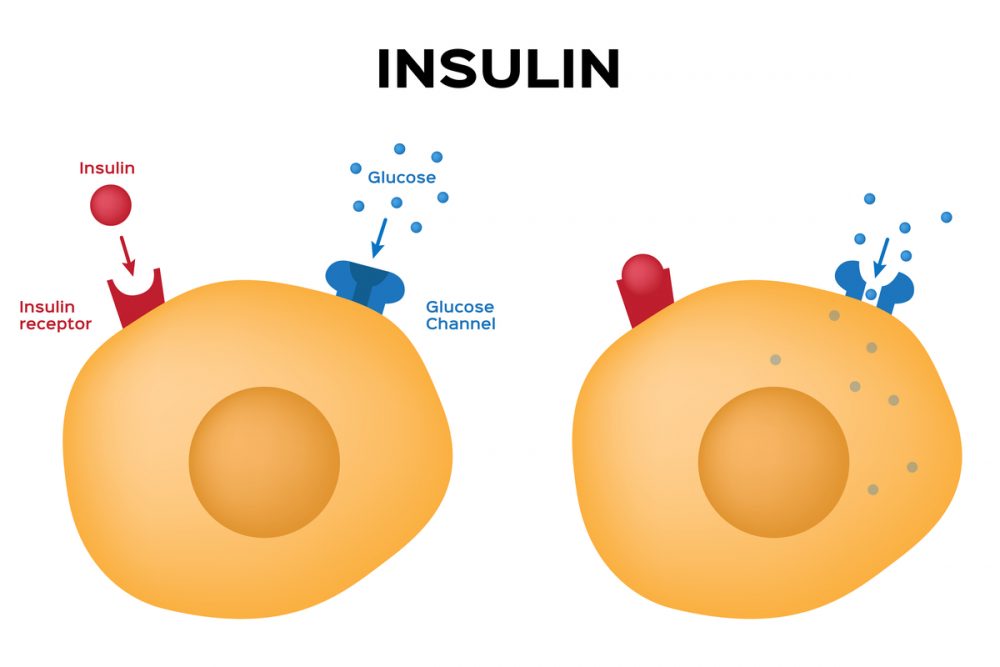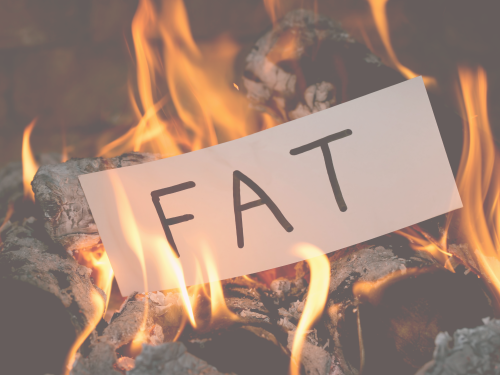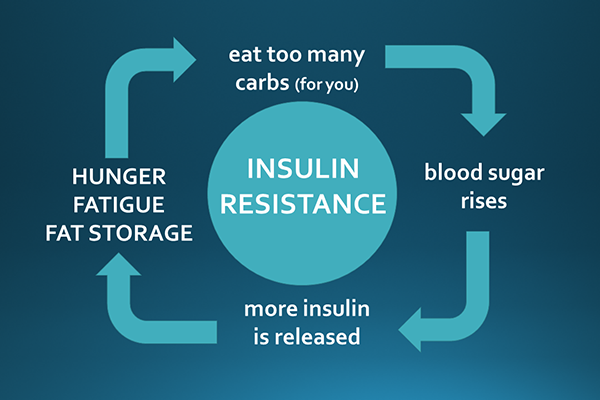Insulin is a hormone that plays a significant role in regulating blood sugar levels and overall metabolism. While it is essential for maintaining proper bodily functions, insulin can become problematic when levels are too high, leading to weight gain, slowed metabolism, and increased hunger. If you’re struggling with weight loss, the issue may lie with your insulin levels. In this post, we will explore how insulin affects your metabolism, fat storage, hunger, and why keeping it balanced is crucial for sustainable weight loss.
@thenewlifechannel♬ original sound – The New Life Channel
What is Insulin?

Before we delve into the effects of insulin, let’s first understand what it is. Insulin is a hormone produced by the pancreas that helps regulate blood sugar (glucose) levels by allowing cells to absorb glucose for energy or storage. It also helps store excess glucose in the liver and muscle cells for later use. While insulin is necessary for various bodily functions, it becomes problematic when it’s consistently high or out of balance.
For many individuals, especially those who are overweight or sedentary, the body becomes resistant to insulin. This means the pancreas has to release more insulin to compensate for the body’s inability to effectively use the hormone. The resulting high levels of insulin can wreak havoc on metabolism, fat storage, and overall health.
High Insulin: The Metabolic Saboteur

High insulin levels can affect several processes in the body, including metabolism, fat storage, and hunger regulation. Here are three truths about high insulin levels that you need to know:
Truth #1: High Insulin Drives Fat and Sugar Into Fat Cells
When insulin levels are elevated in the body, one of the primary functions of insulin is to help move glucose and fat into storage. Insulin essentially tells the body to store fat, especially in fat cells, rather than burn it for energy. This results in the accumulation of fat, making it difficult to lose weight.
Additionally, when the body is in a storage mode, it prevents fat from being used as fuel. This is counterproductive for anyone trying to lose weight.
But the problem doesn’t stop there. High insulin levels slow down the metabolic rate. When the body is storing energy (as fat) instead of burning it, it causes a decrease in the rate at which the body burns calories, which can hinder weight loss efforts.
Truth #2: High Insulin Slows Down Your Metabolism
Your metabolism is responsible for converting the food you eat into energy. It dictates how efficiently your body burns calories throughout the day. However, when insulin levels are chronically high, your metabolism slows down. This means that instead of burning energy and calories efficiently, your body is storing them for later.
A slower metabolism can make it harder for you to lose weight, even if you’re exercising and eating healthily. As insulin keeps your metabolism sluggish, it may require more effort and time to see any significant weight loss.
As your metabolism slows, you may notice other issues like lower energy levels, fatigue, and difficulty staying active throughout the day. A sluggish metabolism can also result in difficulty maintaining a healthy weight and a constant battle with hunger.
Truth #3: High Insulin Prevents Your Body From Using Fat For Fuel
One of the most important aspects of weight loss is your body’s ability to burn fat for fuel. However, this process is blocked when insulin levels are high. Insulin keeps the body in a storage mode and prevents the release of fat from fat cells for energy.
As long as insulin is elevated, fat burning is virtually impossible. The body relies on glucose as fuel rather than tapping into its fat reserves. This is a significant barrier for anyone trying to lose weight since fat burning is essential for long-term weight management and fat loss.
In other words, the more insulin you have in your system, the less likely it is that your body will be able to access its fat stores for energy. Instead, it will continue to burn sugar (glucose) from the food you eat, leaving your fat stores untouched.
Low Insulin: The Key to Fat Burning and Metabolic Flexibility

The opposite of high insulin levels is low insulin levels, which is what we want when aiming for weight loss and fat burning. Low insulin levels can help the body transition from burning glucose to burning fat for energy. This transition is essential for people looking to lose weight and improve their metabolic function.
When insulin is low, the body can enter a state of fat burning, utilizing stored fat as fuel. Additionally, low insulin levels contribute to metabolic flexibility, which means your body can switch between burning carbohydrates and fats efficiently.
Metabolic flexibility is vital for maintaining energy levels throughout the day and promoting fat loss. As the body burns fat for energy, it not only helps with weight loss but also produces ketones—an alternative energy source that is highly efficient and beneficial for overall health.
The Role of Ketones in Fat Burning

When the body enters a state of fat burning, it produces ketones as a byproduct. Ketones are a source of energy derived from fat, which can be used by the body for fuel instead of glucose. This process is highly efficient because the body uses fat for energy, burning stored fat rather than relying on incoming glucose from food.
Ketones are particularly beneficial for brain function, as they provide a clean and stable energy source. When your body is burning fat for fuel and producing ketones, you may experience improved focus, mental clarity, and sustained energy throughout the day.
Moreover, ketones represent “wasted” energy that can further enhance fat burning. As your body continues to burn fat for energy, it expels ketones as a byproduct, which accelerates the fat loss process.
Insulin Resistance: The Root of the Problem

Insulin resistance is when the body becomes less responsive to the effects of insulin, leading the pancreas to release even more insulin to compensate. This often results in high insulin levels, which drive fat storage, slow down metabolism, and prevent fat burning.
One of the main causes of insulin resistance is poor diet—particularly a diet high in refined carbohydrates, sugar, and processed foods. Over time, these foods increase insulin levels and contribute to insulin resistance. Lack of physical activity, poor sleep, and chronic stress can also contribute to the development of insulin resistance.
Reversing insulin resistance is crucial for anyone looking to lose weight, as it allows the body to function properly, burn fat for fuel, and improve metabolism. Fortunately, there are several effective strategies to improve insulin sensitivity and reverse insulin resistance.
Strategies to Reverse Insulin Resistance

- Intermittent Fasting
Intermittent fasting (IF) is a powerful tool for lowering insulin levels. By reducing the eating window, your body enters a fasted state, which reduces insulin secretion and allows your body to burn fat for energy. Studies have shown that intermittent fasting can improve insulin sensitivity and promote fat loss. - Exercise Regularly
Physical activity is one of the most effective ways to increase insulin sensitivity. Regular exercise, particularly strength training and high-intensity interval training (HIIT), helps your body become more responsive to insulin and improves your ability to burn fat. - Limit Refined Carbs and Sugar
Consuming large amounts of sugar and refined carbohydrates leads to insulin spikes and contributes to insulin resistance. By reducing your intake of sugary foods, processed snacks, and refined carbs, you can help stabilize insulin levels and promote fat burning. - Prioritize Whole Foods and Healthy Fats
Eating whole, nutrient-dense foods, including vegetables, lean proteins, and healthy fats, supports stable blood sugar levels and reduces insulin spikes. Healthy fats such as those found in avocados, olive oil, and nuts help balance insulin levels and promote fat burning. - Improve Sleep and Stress Management
Chronic stress and poor sleep can contribute to elevated insulin levels. Practice stress management techniques like meditation, yoga, or deep breathing exercises, and prioritize 7-9 hours of quality sleep each night to help regulate insulin levels and promote overall health.
For a more extensive guide on Intermittent Fasting, I invite you to read my complete guide here.
Final Thoughts: Lowering Insulin for Sustainable Weight Loss

Insulin is a critical hormone that directly influences your body’s ability to burn fat and regulate metabolism. High insulin levels can drive fat storage, slow down metabolism, and prevent fat burning. However, by implementing lifestyle changes like intermittent fasting, regular exercise, and a diet low in refined carbs and sugar, you can reverse insulin resistance and support healthy weight loss.
If you want to optimize your fat burning and improve your metabolism, focusing on insulin management is key. Whether it’s through fasting, exercise, or dietary adjustments, keeping your insulin levels in check will help you achieve sustainable weight loss, increased energy, and better overall health.
By taking these steps and focusing on insulin sensitivity, you’ll not only boost your metabolism but also unlock your body’s natural ability to burn fat for fuel, helping you achieve lasting results.
Get the Help You Need to Reverse Insulin Resistance

Reversing insulin resistance and improving your overall health doesn’t have to be done alone. If you’re ready to take control of your insulin levels and start losing weight in a sustainable way, I can help.
I use a proven, all-natural protocol that has helped countless people reverse insulin resistance, boost their metabolism, and get their health back on track. This program is designed to work with your body, not against it, and it focuses on sustainable lifestyle changes that lead to long-term results.
If you’re ready to take the first step toward reversing insulin resistance and achieving the health and vitality you deserve, click here to learn more about my program. I’m here to guide you every step of the way, and together, we can get you back to living your best life.
Spread the Word: Let’s Empower Our Community

As you continue reading upcoming articles, I encourage you to share this website with friends, family, and colleagues in our community who could benefit from these insights. By spreading the word, you help build a supportive network dedicated to uplifting the health and well-being of our community.
Visit my website to explore more articles and resources designed to offer practical advice for improving health. Your support helps create a space where we can unite in pursuing better health, self-care, and a stronger community.
Want to stay updated on the latest health topics, tips, and upcoming blogs? Subscribe to my email list and never miss out on valuable insights that can help you and your loved ones on your wellness journey.
Together, let’s uplift one another. Share and explore the available resources, subscribe for updates, and join me in the journey toward a healthier, more empowered community.
Your Thoughts Matter

Thank you for taking the time to read this blog. I hope it resonated with you and provided meaningful insights into the health challenges many in our community face. I’d love to hear your thoughts—what obstacles do you encounter, and what strategies have helped you? If there’s a particular aspect of health or wellness you’d like me to explore in future posts, please share your ideas. Your feedback is invaluable and helps me focus on what matters most to you. Let’s keep this conversation going and support one another on the path to better health!
Who is Arnold Brown?

Raised in Louisiana, Arnold Brown graduated from Louisiana State University with a bachelor’s degree majoring in Spanish and minoring in Mandarin Chinese. Upon graduation, Arnold accepted the opportunity to live for two years in China, where he taught English as a Second Language at the University of Ningxia. Being the only African American male in the city where he lived, Arnold describes his experience as absolutely life-changing. Arnold speaks 4 languages fluently, English, Spanish, Portuguese, and Mandarin Chinese. Arnold currently teaches Spanish classes online, tutors, and also has very own self-paced Spanish learning online program. If you would like to learn more about Arnold’s background, click here.
Arnold Lost 63 Lbs in 18 Weeks
Having undergone a profound transformation in 2020, Arnold also discovered a deep passion for health and wellness, and now dedicates himself to teaching the same principles that transformed my life, especially within the community. As a certified personal trainer, nutritionist, bodybuilding specialist, and youth fitness instructor, learn how Arnold lost 63 lbs in 18 weeks by reading his story here.
